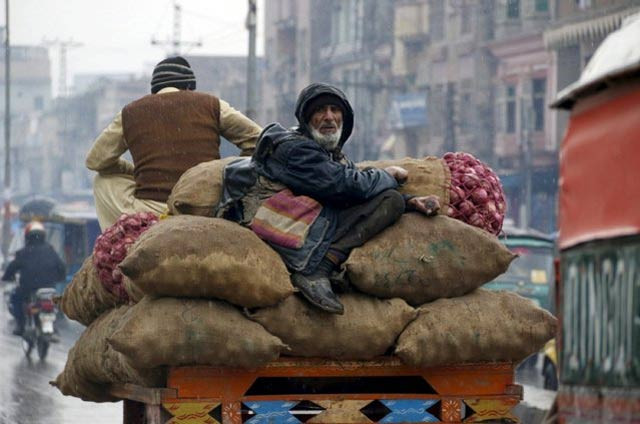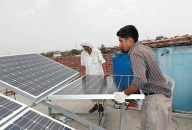Despite high growth rate, living standards continue to decline
Govt’s failure to provide health care, education and water has put more burden on people.

PHOTO: REUTERS
Our government these days is celebrating the highest annual growth rate in the last 10 years along with claims of well-managed inflation.
But how true are these claims? How correct are these figures? And are the people truly satisfied with the performance? These are questions that require a deeper discussion and thorough analysis.
Orangi residents take to the streets, demand solutions to problems
If you travel around the city and meet different people, you come to realise that fruits of both controlled inflation and high economic growth are not so visible. Miserable life of a common man compels us to doubt these lauded claims of the government. But how can we question the figures issued by the government?
I will take a slightly different, highly unusual and simply undeniable route to reason. All the readers can check this evidence and testify and relate to it.
My grandfather migrated from India in 1952 and he was almost penniless at that time. Along with his family, he lived in a temporary settlement – a Jhuggi – and not in a house built of bricks and mortar.
However, by 1958 he managed to save enough to buy a decent house in the city. He was not alone in achieving this and most family members had been able to get decent accommodation within 10 years of migration. Bear in mind that most of these people were clerical government servants and nothing more.
My grandfather and his contemporaries managed numerically larger households than today. The average family size at the time was around eight to nine members. But affordability or affluence – whichever way you want to put it – was sufficient in those days for middle-class families to raise a son or two of their sibling(s) and this was a commonplace occurrence.
One breadwinner in the family was feeding and raising a family of around 10 people. This means that inflation was truly low and fruits of economic growth were widespread and visible in those times.
Today’s living standards
Now compare this with our living standards of today. We have small families of four to five individuals and almost every one capable of working is working. Some have multiple sources of income and yet all of us are indebted. All of us are stressed all the time to make both ends meet and all of us are in a state of constant worry and long-lasting unhappiness.
This is a stark contrast between living standards of my generation and the generation of my grandfather. Certainly, all the readers hear similar stories from their aging family members.
This deterioration in living standards is largely due to the government. It has silently retreated from all its duties. Health and education are public goods. They have so many positive externalities that they can be provided well and efficiently only by the government and this happens in the entire world.
Sadly, this happened in Pakistan of my grandfather’s time. Now the burden is on the people. Along with the burden of health and education, people, especially in Karachi, are bound to purchase water for consumption, which is an utter failure of the government.
Electricity prices have multiplied and all these things clubbed together have increased the cost of living in Pakistan.
People have also unnecessarily complicated their lives. We are posing all the time for others - dining out every week to post pictures on Facebook and embarking on lavish vacations every year again to populate the Facebook walls.
And yes my grandfather made a house for his family within six years of migration. This luxurious dream can never be imagined by someone with similar circumstances in today’s Pakistan.
The evidence of true inflation and sad tale of declining living standards cannot be witnessed in well-ornamented figures and ostentatious statistics provided by the government. This tragic story is written on the face of every common man.
IMF says Pakistan’s hard-won economic stability at stake
This story is manifested in the increasing crime rate in our society. This story is witnessed on the pavements outside hospitals where worrisome faces are in ample supply.
This story is witnessed in the narrow and suffocating alleys of Lyari and Liaquatabad – the alleys uninhabited by fresh air and devoid of bright sunlight.
The government must come to terms with reality. It must end the endless exercise of perception management through cooked-up figures and must resort to its essential duty ie serving the people of this land.
The author is a corporate banker and also teaches economics
Published in The Express Tribune, June 12th, 2017.
Like Business on Facebook, follow @TribuneBiz on Twitter to stay informed and join in the conversation.



















COMMENTS
Comments are moderated and generally will be posted if they are on-topic and not abusive.
For more information, please see our Comments FAQ